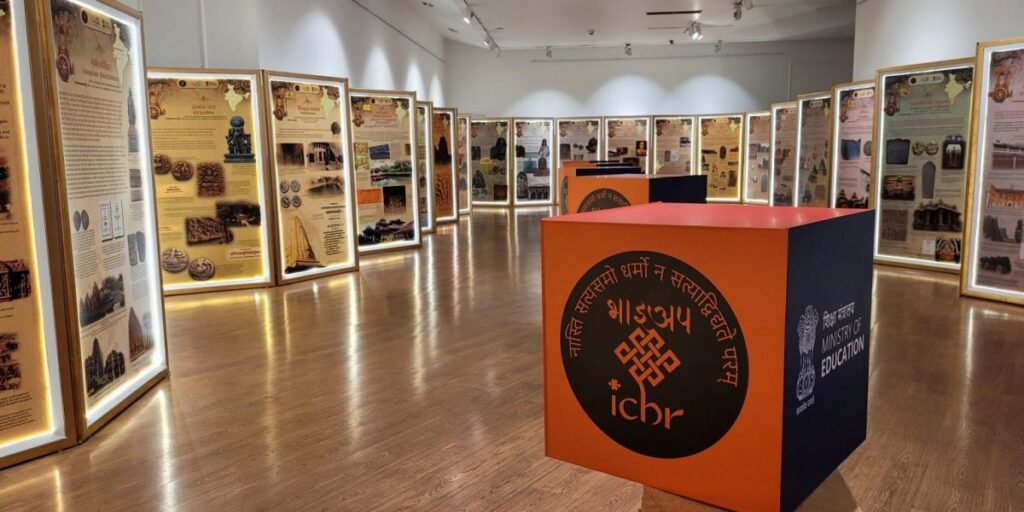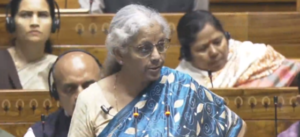Responding to a question by Communist Party of India MP K. Subbarayan in Lok Sabha on February 13, 2023, Union education minister Dharmendra Pradhan said that the Indian Council of Historical Research, a body under the Union education ministry, has not taken up any project to rewrite history and it is only working on filling the “gaps” in history.
In response, Congress MP Manish Tiwari pointed out in a supplementary question that Pradhan’s claim was in contradiction to the statements made by the council which is continuously and publicly boasting of ‘rewriting history’.
Tiwari was referring to the claims made by office-bearers of the council, who have said that they are writing a ‘comprehensive history of India’ which will be 12 to 14 volumes in length and will be a record of Indian history from the Indus Valley civilisation till date. It may take several years to prepare, they have claimed.
In November 2022, ICHR member secretary Professor Umesh Ashok Kadam again made a statement claiming that “history is being rewritten” with the help of regional language resources and scripts. More than a hundred historians across the country are engaged in this work and the first volume is likely to come out in March 2023, he said.
Kadam said they would give due credit to “those dynasties which were left out” earlier. The ICHR’s “new history” may take some time to complete, but there’s nothing stopping their efforts to invent it.
The exhibition organised by the council last month at Delhi’s Lalit Kala Akademi on the theme ”Glory of Medieval India: Manifestation of the unexplored Indian dynasties, 8th-18th centuries’ appears to be an attempt towards wrapping up this mammoth project of ‘rewriting history’.
What is ‘new history’?
When asked at the inauguration on January 30 as to why the exhibition does not mention Muslim rulers who ruled medieval India, Kadam replied that he does not consider Muslim dynasties as part of Indian dynasties.
“Those people (Muslims) came from the Middle East and have no direct connection with Indian culture,” he said.
“Islam and Christianity came to India in the medieval period and destroyed the education system and civilisation,” he added. Kadam added that while Islamic dynasties are a part of Indian history, but history should not be centred on the Mughals or the Sultanate.
The exhibition featured banners of more than 50 dynasties – which the ICHR claimed were “unexplored” – including the Maratha, Ningthouja, Ahom, Chola, Manikya, Kachwaha, Hindu Shahi and many others.
The chief guest at the inaugural function, Minister of State for External Affairs and Education Rajkumar Ranjan Singh, said that Prime Minister Narendra Modi has asked the ministers to get over the ‘colonial hangover’.
“We have to purify history in the journey from independence to Swaraj,” he said.
Professor Harbans Mukhia is an Indian historian who taught for a long time at the Jawaharlal Nehru University until his retirement in 2004. His work focuses on medieval India and he has written several books on Indian history and the medieval period.
When asked about the exhibition and the statement of the member secretary of the ICHR, Mukhia said, “They are taking us back to where James Mills left us in 1818…”
James Mills was a Scottish historian who wrote the History of British India, containing his views on Indians which have often been criticised. In this three-volume book, written in the early 19th century, Mills divided Indian history into three periods – Hindu, Muslim and British.
“Historiography has always been changing, but what is happening now is completely different. In the years succeeding 1947, history penned before independence was ‘decolonised’. Now, it is being ‘recolonised’ but they have no axis. To be honest, even graduation students do not talk of rulers as being Hindus or Muslims,” Mukhia said.
Historian S. Irfan Habib views the ‘rewriting’ of history, especially in the context of this exhibition, differently.
“First of all, this is not how history is written,” he said. “The history of medieval India is neither solely about Hindu dynasties nor solely of Muslims. What is known as the period of Muslim rule is also not entirely about Muslim rulers. There were many Muslim rulers who used to rule alongside the Rajputs. Governance was a collaborative project. So, whatever is being done is an absurd effort, which makes no sense,” he said.
When asked about the motive for such an attempt, Habib said, “It is nothing but their bigotry which compels them to do all this. The same thing was done in Pakistan, which we always criticised. Their history starts from Mohammed bin Qasim. Earlier than that is not history for them. Now, one is also following the same path. I don’t think one can make India a better place by following the footsteps of Pakistan.”
‘Rising hate against Muslims’
Habib believes that such efforts are part of the trend of ‘alienating Muslims’ in present-day India.
“There is a hatred which they keep expressing again and again through their actions. There is only one sentiment behind it – to completely erase Muslims from history leaving no trace even in the names of buildings, gardens, cuisine, or anything else.”
The attitude of the BJP towards Muslim rulers, especially the Mughals and their history, is evident. Recently, the famous Mughal Gardens of Rashtrapati Bhavan was renamed ‘Amrit Udyan’. In 2017, under the Devendra Fadnavis-led BJP government in Maharashtra, not only were the chapters on Mughal rulers removed from school textbooks, mentions of monuments and buildings built by them were also edited out.
In the last eight years, the BJP government’s frenzy to erase any name or identity with the slightest hint of being Muslim has become blatantly clear.
Last month, BJP leaders objected to one of the venues at the Jaipur Literature Festival being called ‘Mughal tent’. On one occasion in June 2022, Union home minister Amit Shah was even seen expressing grief over the country’s ‘wrong history’ as he appealed to the historians of the country to ‘revive the ancient glory in the present times’. He also said that most of the historians of the country have given a prominent place only to the Mughals in history, but in doing so they have ignored the valour of many great empires.
Rejecting such claims of the BJP leaders, Professor Apoorvanand of Delhi University said, “If there is anything India is rich in, it is historiography. There have been historiographers who were nationalists, rightists, leftists, Marxists, subaltern historians who challenged Marxism, and then there were writers free from all such ideologies. Therefore, to say that it [written history] is a mistake is wrong because the methods of writing history have kept changing.”
“Every method in every period has its limitations. It is not about deliberately omitting or including something. What is important is the picture that emerges from what has happened collectively in the last hundred years in historiography. Knowledge is collective, and not homogeneous,” he added.
Irfan Habib feels that while there are many shortcomings in history writing, it cannot be simplified like this. “For instance, our history has largely been focused on North India, with limited focus on the Northeast, but you cannot draft it by linking it with religion,” he said. “You should actually work on the shortcomings and do so with a broadminded outlook. But to write the history of only Hindu rulers arguing that earlier they were omitted is not the solution. Visit libraries, sift through them and see how many books have been written.”
“Also, look at all the places where Rajputs are mentioned in books written on the Mughals,” he added.
“There were big mansabdars [members of the bureaucracy] during the Mughal era – Jaswant Singh, Jai Singh, Man Singh – apart from many kings at the smaller levels. There has always been the participation of Hindus and Muslims in governance and this was happening not only during Mughal rule, but from the time of Shershah. Today, such propaganda is spread in order to keep the society polarised and divided. It has nothing to do with history but only with the politics of the day. Today, the agenda is to use history to keep people divided. And they have somewhat succeeded in doing so too.”
“In India, historiography has been done by right-wing historians too,” Professor Apoorvanand added, “but even they did not adopt such a divisive approach which these people are resorting to. It is a completely absurd, or rather a diabolical division. It means you are refusing to consider anything or anyone Muslim as Indian. The Mughals are pure Indian. Many other Muslim dynasties and rulers, besides the Mughals, like Haider Ali, Tipu Sultan, etc., are all Indian.”
Questions raised on source of information
Amid claims about the rewriting of medieval history by the ICHR, the absence of citations in the exhibition is also being questioned. Around 50 banners in a hall of the Lalit Kala Akademi had pictures, flags, buildings, etc. of different dynasties, but no reference was mentioned on any.
An expert who attended the exhibition said that all the information was extracted from Wikipedia, which is not a reliable source by its own admission, considering that it allows users to edit articles.
“Only those who have an important role find mention in history,” said Habib. “It is not in the capacity of historians to collect information about every small ruler, nor are there many sources available. So, you will have to create imaginary facts because real facts will not be found. Thus, you will not write history, you will have to invent it.”
“The source is WhatsApp,” he added.
“That’s where the history is coming from. If you refer to any historical event or person, you have to provide a reference, the year or the name of a book or page number. If someone is writing history very carefully, you may agree or disagree with their interpretation, but not with facts. How you will read it depends on your ideology and perspective, but facts are common knowledge and information. The one who is writing has his own prejudices or assumptions, but the sources have to be honest. Whatever is being done nowadays involves no source. Whatever comes to mind is blurted out and then sources are coined accordingly. That is the problem.”
In 2017, Mukhia wrote in one of his articles, “George Orwell wrote in the novel 1984 that the one who has control over the present also has control over the past. It means that you can twist and turn the past however you want, because you need it in the present. What was meant as fiction seems to be becoming a reality in our country today.”
(Translated by Naushin Rehman. Courtesy: The Wire.)




